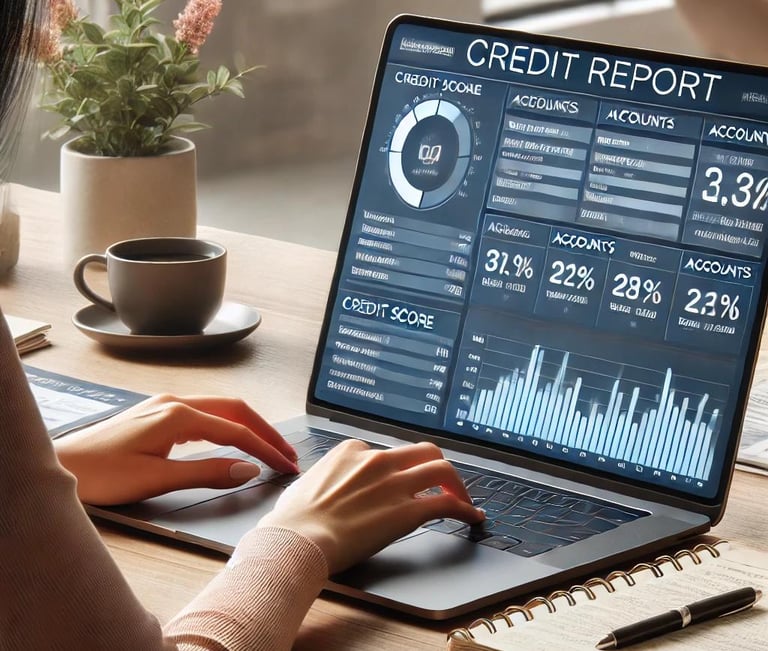Understanding Credit Scores and Reports: Essential Tips
Discover what credit scores and reports are, their history, and how they impact your financial health. Learn the dos and don'ts for managing your credit effectively.
FINANCE


Credit scores and reports are critical components of your financial health. They influence everything from the ability to secure a loan to the rates you pay for insurance. But what exactly are they, and why do they matter so much? Let’s dive into the fascinating world of credit scores and reports!
What is a Credit Score?
A credit score is a numerical representation of your creditworthiness. It is calculated based on information from your credit reports and helps lenders assess the risk of lending you money. Generally, credit scores range from 300 to 850, with higher scores indicating lower risk to lenders.
Key Factors Influencing Your Credit Score:
Payment History (35%): Timely payments on your credit accounts.
Credit Utilization (30%): The ratio of your credit card balances to your credit limits.
Length of Credit History (15%): The age of your credit accounts.
Types of Credit Accounts (10%): The variety of credit types you have (e.g., credit cards, mortgages).
New Credit (10%): Recent credit inquiries and new credit accounts.
What is a Credit Report?
A credit report is a detailed record of your credit history. It includes information about your credit accounts, payment history, and any outstanding debts. Lenders use this report to decide whether to grant credit and at what terms. Major credit reporting agencies—Experian, TransUnion, and Equifax—compile and maintain these reports.
Components of a Credit Report:
Personal Information: Your name, address, and Social Security number.
Credit Accounts: Details of your credit cards, mortgages, and loans.
Credit Inquiries: Record of who has accessed your credit report.
Public Records: Bankruptcies, foreclosures, and other legal issues.
Facts About Credit Scores
Credit Score Range: The average credit score in the U.S. is around 700, which is considered good.
First Credit Score: The first FICO score was introduced in 1989.
Credit Score Myths: Many believe checking your own credit score will lower it, but it does not. This is known as a "soft inquiry."
Things to Do and Don’t Do
Dos:
Check Your Credit Report Regularly: Review your credit reports at least annually for errors.
Pay Your Bills on Time: Timely payments are crucial for maintaining a good credit score.
Keep Credit Utilization Low: Aim to use less than 30% of your available credit.
Don’ts:
Avoid Unnecessary Credit Inquiries: Frequent hard inquiries can lower your credit score.
Don’t Ignore Your Credit Report: Errors can harm your credit score and should be corrected promptly.
Don’t Close Old Accounts: Length of credit history positively impacts your score.
The History of Credit Scores
The concept of credit scoring dates back to the 1950s when a mathematician named William Fair and an economist named Earl Isaac created the first credit scoring system, now known as FICO. This system aimed to objectively assess a person's creditworthiness based on their credit history. Over the decades, credit scoring models have evolved, incorporating more data and sophisticated algorithms to better predict financial behavior.
Mastering Credit Scores: Essential Tips, Myths, and Strategies for Financial Success
How Credit Scores Are Calculated: Key Factors to Know
What factors influence your credit score? Payment history, credit utilization, and length of credit history are crucial.
How are credit scores calculated (FICO vs. VantageScore)? Both FICO and VantageScore weigh your financial behavior, but the scoring models differ slightly.
Why do these factors matter? Payment history and credit utilization have the biggest impact, so pay on time and keep debt low.
FICO vs. VantageScore: Which Credit Score Matters More?
FICO vs. VantageScore: Which one is used more by lenders? FICO is more commonly used, but both scores matter depending on the lender.
How are the FICO and VantageScore models different? FICO emphasizes credit history and utilization, while VantageScore includes alternative data like utility payments.
Which score should you track? Focus on FICO, but don't ignore VantageScore.
How to Check Your Credit Score for Free and Paid Options
Where can you check your credit score? Use free services like AnnualCreditReport.com or paid credit monitoring services for more features.
What’s the difference between free and paid credit reports? Free reports offer basic info, while paid services include identity theft monitoring and alerts.
How often should you check your credit score? Aim to check it quarterly to catch any errors or changes.
How to Improve Your Credit Score: Actionable Tips
What are the best ways to boost your credit score? Pay bills on time, reduce outstanding balances, and avoid new credit inquiries.
Why is paying on time so important? Payment history is the single biggest factor in determining your credit score.
How can reducing credit card balances help? Lowering your credit utilization below 30% can significantly improve your score.
Debunking Credit Score Myths: What Really Matters
Does checking your credit lower your score? No, soft inquiries, like checking your own score, don’t affect it.
Does closing old accounts boost your score? Not necessarily. Closing accounts can reduce your available credit and hurt your utilization ratio.
Will too many inquiries hurt your score? Multiple hard inquiries within a short period can slightly lower your score.
How Credit Scores Affect Loans and Credit Card Applications
Why does your credit score matter for loans? Higher credit scores get lower interest rates, higher limits, and better loan terms.
How do credit scores impact mortgage, auto loan, and credit card approvals? A good score increases approval chances and leads to better loan offers.
What can you do with a low credit score? Explore secured credit cards or lower-risk loans to start building credit.
Understanding Credit Reports and Your Financial Health
What’s included in your credit report? It tracks your credit accounts, payment history, inquiries, and public records.
How can you read and interpret your credit report? Look for negative marks, high balances, and recent credit inquiries.
How do you dispute errors? Contact the credit bureau to correct any mistakes that might be dragging your score down.
How to Build Credit from Scratch: A Beginner’s Guide
How can you start building credit? Use secured credit cards or become an authorized user on someone else’s account.
What’s the benefit of secured credit cards? They allow you to build credit responsibly by making small charges and paying them off.
Tips for young adults and new immigrants: Use a mix of credit types responsibly and pay off balances in full each month.
How to Recover from a Low Credit Score
What steps should you take to rebuild your credit? Pay down debt, catch up on late payments, and avoid taking on new debt.
How can you bounce back from bankruptcy or foreclosure? Start with secured loans and ensure all payments are made on time.
Why seek financial counseling? A professional can help you create a strategy to rebuild your credit and manage debt.
How Credit Scores Impact Your Insurance Premiums
How do credit scores affect insurance premiums? A low credit score can raise your car and home insurance rates.
What’s an insurance score? It’s a score based on your credit history used to predict your likelihood of filing a claim.
How can you lower both credit and insurance costs? Improve your credit to reduce premiums and regularly compare insurance quotes.
How Credit Scores Impact Job Prospects
Why do employers check credit reports? Some employers use credit checks to gauge trustworthiness for sensitive roles.
How can your credit affect employment? A poor credit history may raise concerns in financial or managerial positions.
What are the legal protections for job seekers? Employers need your permission to run a credit check, and not all do.
How Major Life Events Affect Your Credit Score
What impact do marriage and divorce have on credit? Joint accounts can affect both partners' scores, especially if one partner mismanages credit.
How can you protect your credit during financial hardships? Contact creditors early to discuss deferral or payment plans.
What are strategies to maintain a good credit score? Avoid missed payments, reduce debt, and set up alerts to monitor changes.
How to Use Credit Responsibly
How can you avoid credit card debt? Always pay more than the minimum and avoid carrying a balance whenever possible.
Why is budgeting essential for credit health? Budgeting prevents overspending, late payments, and accumulating debt.
How do you handle credit responsibly? Use credit wisely by paying off balances monthly and tracking spending.
The Future of Credit Scoring: What’s Next?
What are the emerging trends in credit scoring? Alternative data like rental payments and utility bills may soon play a bigger role.
How is fintech changing credit assessments? New technology is expanding access to credit for people with little to no traditional credit history.
What’s next for credit scores? Expect more predictive, real-time models that incorporate a broader range of data.
Neglecting to Check Your Credit Report: Risks, Stories, and Solutions
What are the risks of neglecting your credit report? Errors or identity theft could go unnoticed, damaging your score.
Real stories of credit report errors: Many people find incorrect info on their reports that has hurt their creditworthiness.
Solutions to stay on top of your credit: Check your credit report annually and dispute any errors to protect your financial health.
